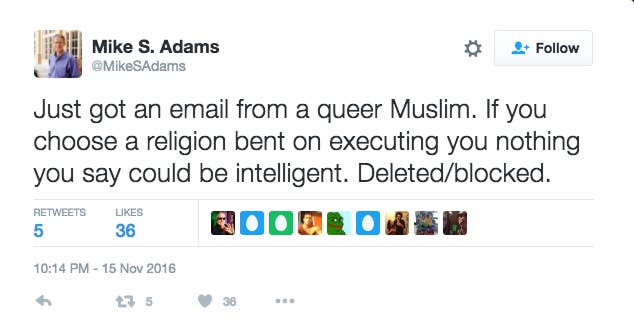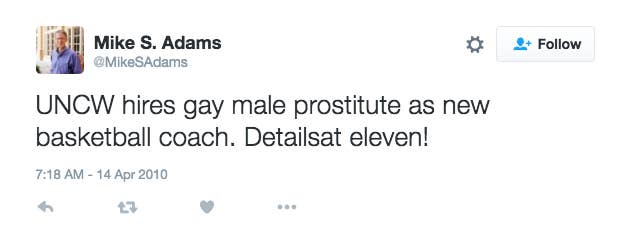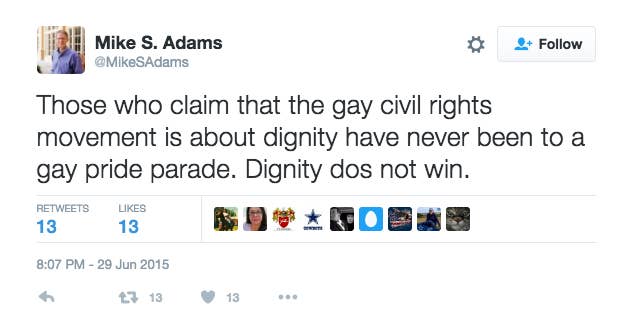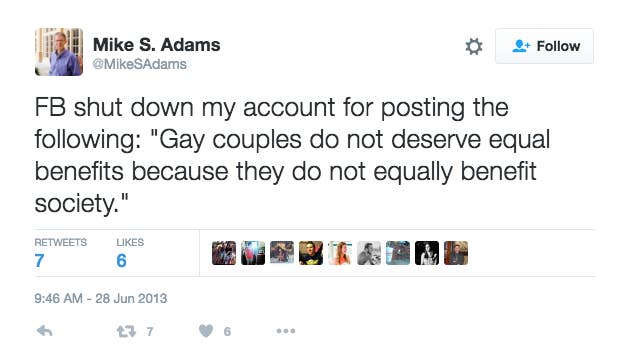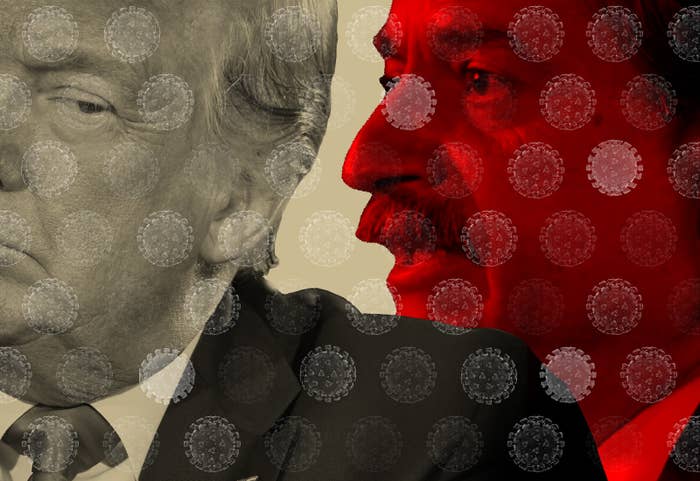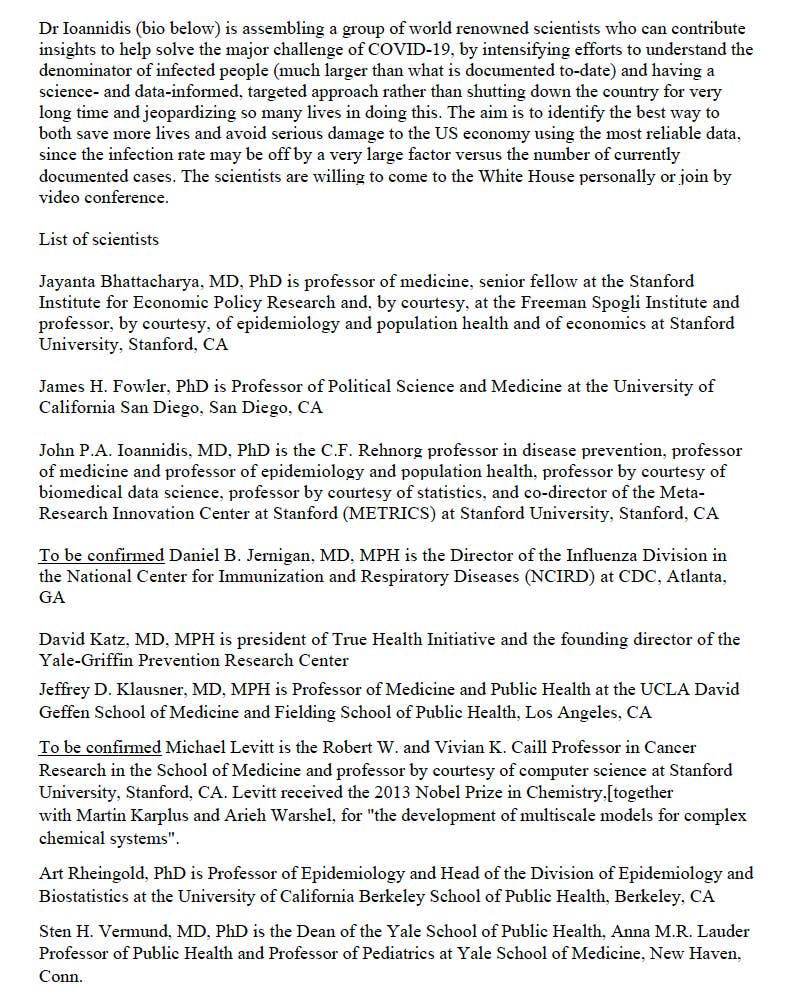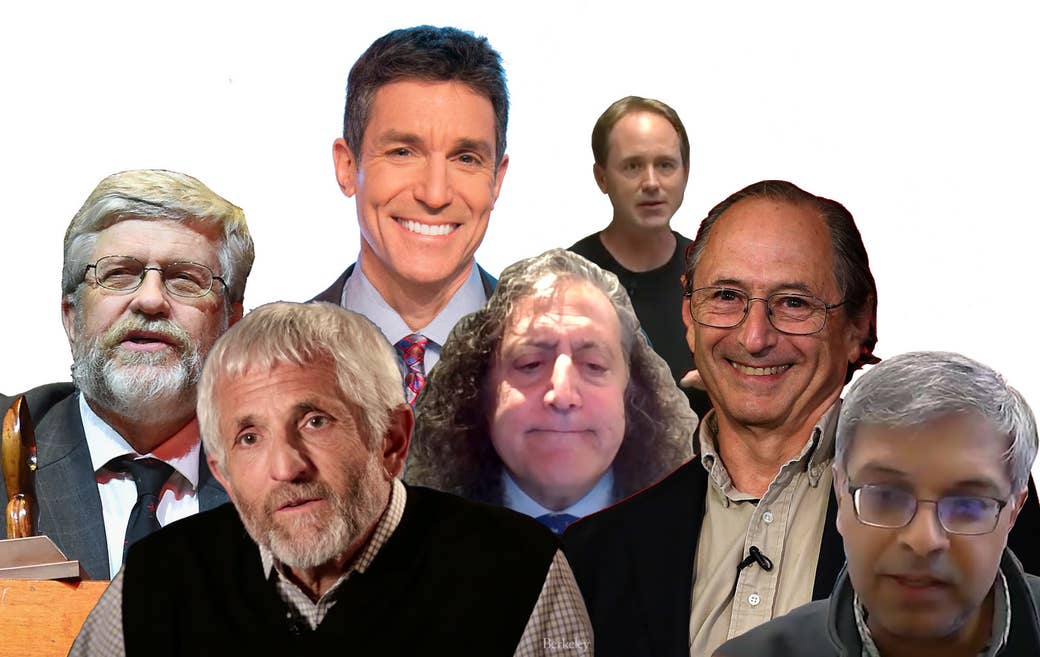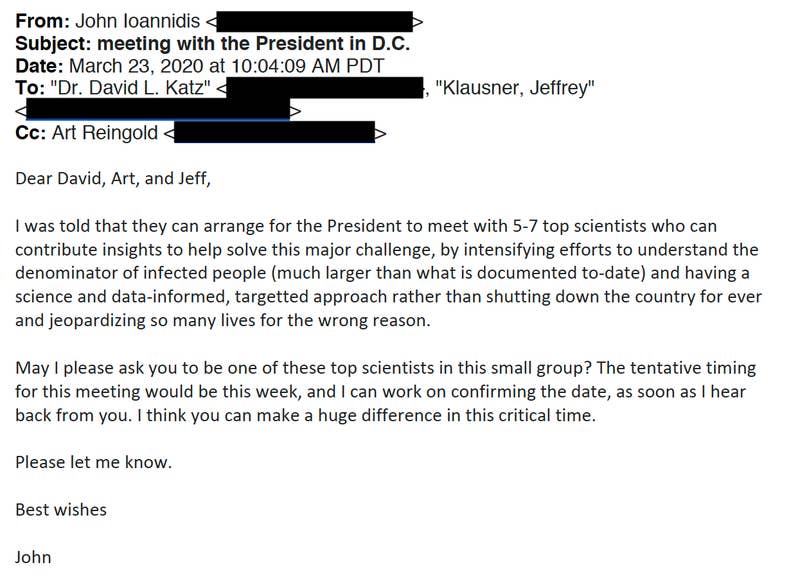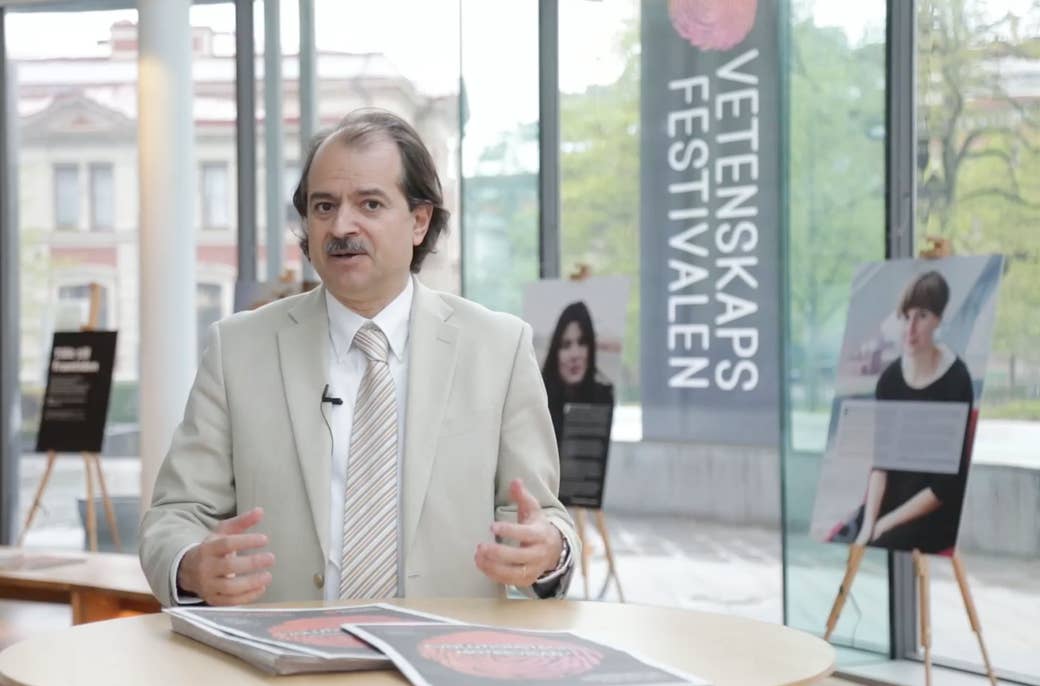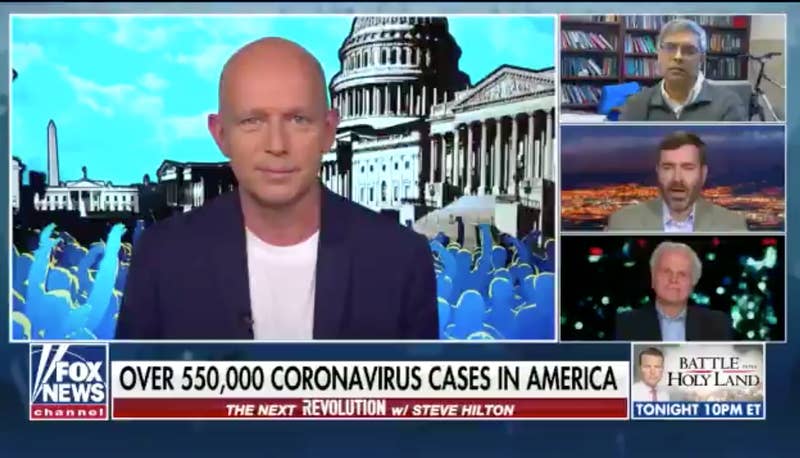Stephanie K. BaerBuzzFeed News Reporter
Last updated on July 24, 2020
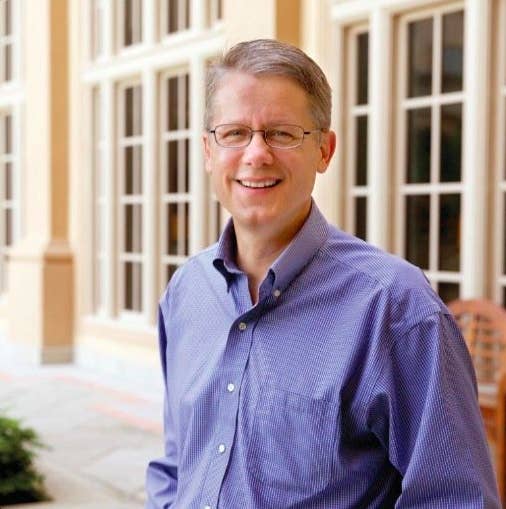
Mike Adams
University of North Carolina Wilmington professor Mike Adams, who was known for his anti-LGBTQ, misogynistic, and racist remarks, was found dead in his home Thursday, days before he was due to retire as part of a settlement with the school.
New Hanover County Sheriff's Lt. Jerry Brewer told BuzzFeed News deputies were called to Adams' home in Wilmington at 12:30 p.m. for a welfare check and found the professor dead.
His death is under investigation and no additional information was immediately available.
Earlier this month, UNCW agreed to pay Adams, a criminology professor, more than $500,000 as part of an early retirement settlement reached between the parties after the professor again came under fire for his tweets about the coronavirus and recent protests against racism and police brutality. According to the News & Observer, Adams was set to retire Aug. 1.
In May, Adams criticized Gov. Roy Cooper’s pandemic stay-at-home orders in several tweets, calling him "Massa Cooper."

Mike S. Adams@MikeSAdams
This evening I ate pizza and drank beer with six guys at a six seat table top. I almost felt like a free man who was not living in the slave state of North Carolina. Massa Cooper, let my people go!11:08 PM - 29 May 2020
Reply Retweet Favorite
In another tweet, he wrote, "Don't shut down the universities. Shut down the non essential majors. Like Women’s Studies."
Over the years, people have started online petitions calling on the university to fire Adams. A recent Change.org petition that described him as a longtime "thorn in the side of UNC Wilmington" garnered more than 60,000 signatures.
In a letter announcing Adams' retirement, UNCW Chancellor Jose V. Sartarelli wrote that the settlement was "less damaging" to the university and the best way its leadership could resolve the situation.
Sartarelli said that attempting to fire Adams would have resulted in "very costly litigation, that we might not win," citing a 2014 First Amendment lawsuit he filed that cost the university about $700,000.
"In addition to saving money, the settlement will prevent the continued disruption to our educational mission, reduce concerns around campus safety, and lessen the harm to the institution," the chancellor said. "Dollars are precious, but our institutional integrity is priceless."
A university spokesperson said in a statement, "It is with sadness that we share the news that the New Hanover County Sheriff’s Office is conducting a death investigation involving Dr. Mike Adams, professor of criminology. Please keep his friends and loved ones in your thoughts."
University of North Carolina Wilmington professor Mike Adams, who was known for his anti-LGBTQ, misogynistic, and racist remarks, was found dead in his home Thursday, days before he was due to retire as part of a settlement with the school.
New Hanover County Sheriff's Lt. Jerry Brewer told BuzzFeed News deputies were called to Adams' home in Wilmington at 12:30 p.m. for a welfare check and found the professor dead.
His death is under investigation and no additional information was immediately available.
Earlier this month, UNCW agreed to pay Adams, a criminology professor, more than $500,000 as part of an early retirement settlement reached between the parties after the professor again came under fire for his tweets about the coronavirus and recent protests against racism and police brutality. According to the News & Observer, Adams was set to retire Aug. 1.
In May, Adams criticized Gov. Roy Cooper’s pandemic stay-at-home orders in several tweets, calling him "Massa Cooper."

Mike S. Adams@MikeSAdams
This evening I ate pizza and drank beer with six guys at a six seat table top. I almost felt like a free man who was not living in the slave state of North Carolina. Massa Cooper, let my people go!11:08 PM - 29 May 2020
Reply Retweet Favorite
In another tweet, he wrote, "Don't shut down the universities. Shut down the non essential majors. Like Women’s Studies."
Over the years, people have started online petitions calling on the university to fire Adams. A recent Change.org petition that described him as a longtime "thorn in the side of UNC Wilmington" garnered more than 60,000 signatures.
In a letter announcing Adams' retirement, UNCW Chancellor Jose V. Sartarelli wrote that the settlement was "less damaging" to the university and the best way its leadership could resolve the situation.
Sartarelli said that attempting to fire Adams would have resulted in "very costly litigation, that we might not win," citing a 2014 First Amendment lawsuit he filed that cost the university about $700,000.
"In addition to saving money, the settlement will prevent the continued disruption to our educational mission, reduce concerns around campus safety, and lessen the harm to the institution," the chancellor said. "Dollars are precious, but our institutional integrity is priceless."
A university spokesperson said in a statement, "It is with sadness that we share the news that the New Hanover County Sheriff’s Office is conducting a death investigation involving Dr. Mike Adams, professor of criminology. Please keep his friends and loved ones in your thoughts."
Professor's Racist And Anti-Gay Language Sets Off Free-Speech Battle On Campus
More than 2,000 people have signed a petition calling for the University of North Carolina Wilmington to fire professor Mike Adams while the university says his opinions are protected by the First Amendment.
Tasneem NashrullaBuzzFeed News Reporter
Posted on November 29, 2016, at 6:26 p.m. ET
More than 2,000 people have supported a petition calling for the University of North Carolina Wilmington to terminate professor Mike Adams for his "history of spewing misogynistic, xenophobic, transphobic, homophobic, racist rhetoric" and for publicly mocking a Muslim student's sexual orientation and religion on his blog.
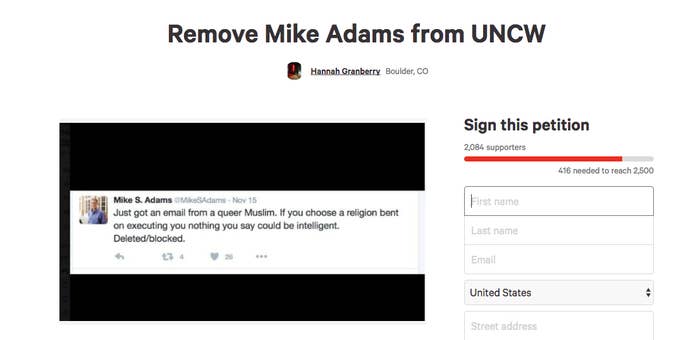
change.org
The petition said, in part, about the criminology and sociology professor: "Adams has disrespected the university's promise to provide a safe environment for all individual student[s], and instead has mocked and ridiculed not only individuals, but entire groups. These actions are not acceptable, and no university should make a student feel unsafe."
Adams sparked outrage when he targeted Nada Merghani, a Sudanese refugee and LGBT student-activist at UNCW, in a September article titled "A 'Queer Muslim' Jihad" in which he said "her claims to be a 'queer Muslim' are probably part of an act designed to fit into as many victim categories." The university said Adams' opinions were protected by the First Amendment.
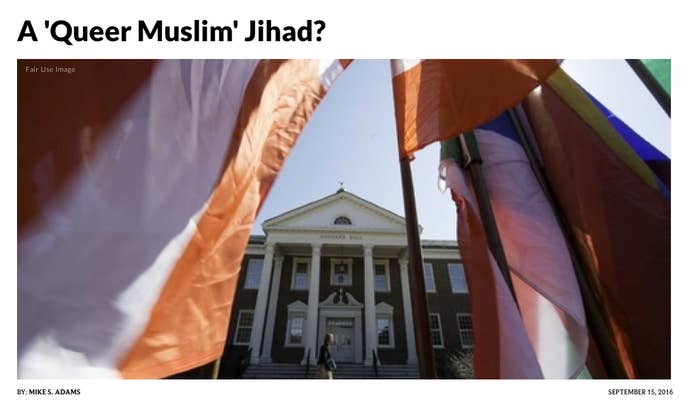
dailywire.com
Adams' piece on Merghani was published in response to an incident in August in which Secret Service agents questioned her about her Facebook post regarding Donald Trump's visit to the campus.
In the post, Merghani, who is the founder of the Muslim Student Association at UNCW, said, "Expect to see me at the Trump rally on Tuesday. Y’all are not prepared for what I’m about to do." It ended with, “All I can say is pray I make it out of this alive.”
While the agents were satisfied that Merghani did not pose any threat, Adams wrote, "That sounds like a suicide mission for those who have never met Merghani."
He also described Merghani as "the most frightening type of student imaginable ... A self-described 'queer Muslim social justice warrior.'"
In a Tumblr post responding to Adams' piece, Merghani detailed allegations of troubling online interactions with the "tenured professor."
Merghani told BuzzFeed News in late November that she was leaving UNCW because Adams' behavior took a "toll on me emotionally and severely affected my academic journey."
Merghani said that since she was from a country where being gay is punishable by death, she was very careful about the platforms she chose to identify herself as a queer Muslim woman and often changed her last name to protect her identity. "People were shocked that [Adams] outed me and used my full name in his article," Merghani said.
Adams called Merghani's notion that he "outed" her "comical" and said she "outed herself."
In an email to BuzzFeed News on Tuesday, Nov. 29, Adams said, "The notion that I somehow 'outed' her in my column is comical. She is the founder of the Muslim Student Association and President of a gay pride group. She 'outed' herself when she consented to an interview with the College Fix. Furthermore, her accusations against me of instigating threats have now been investigated and proven false."
In a statement to BuzzFeed News on Nov. 29 a UNCW spokesperson said, "We are deeply disappointed by the use of hateful, hurtful language to degrade a fellow human being, even when that language is legally protected speech. However, we have fully investigated this matter and believe we have done all we are able to do to support the student involved, given that the comments were not made in a UNCW living, learning or working environment or otherwise affiliated with the faculty member’s role at UNCW."
In an earlier statement following a review of the incident, the university had said that Adams' opinions were protected by the First Amendment.
"Dr. Adams’s online column and social media presence represent his personal expressions and opinions on a variety of topics," the statement said. "These expressions and opinions are neither within the requested scope of Dr. Adams’s duties with the university, nor do they represent the views of this institution. However, they are expressions protected by the First Amendment to the United States Constitution."
The university also said it had not found evidence that Adams had "improperly released any private or confidential information to the student, or violated the Family Education Rights and Privacy Act (FERPA)" and that there was no evidence of "unlawful discrimination" by him toward Merghani per the school's harassment policy.
"Finally, Dr. Adams’s conduct and written material do not contain any evidence of a true threat toward this or any other student," the statement said.
Merghani said that while she supported the petition to get Adams fired, she was focused on holding the UNCW administration accountable for "allowing this to happen" and for "protecting" him.
"If Mike Adams wasn’t given a platform, if he didn’t have access to young impressionable minds, he would be another angry internet troll."
ADVERTISEMENT
Adams' post on Merghani, along with other posts and tweets — in which he called the Black Lives Matter movement a "terrorist organization," compared the acceptance of LGBT individuals to rape, referred to gay people as "fags," and tweeted about killing Muslims "who criticize Danish cartoons" — has triggered a fierce free-speech debate on campus and is gaining national attention.

Twitter: @MikeSAdams
Adams, who describes himself as a free-speech advocate and has worked at UNCW since 1993, sued the university in 2006, alleging that it denied him a promotion to full professor "because his nationally syndicated opinion columns espoused religious and political views that ran contrary to the opinions held by university officials." He alleged that the university had violated his First Amendment right to free speech.
After a seven-year legal battle, UNCW settled the case with Adams, promoting him to full professor and agreeing to $50,000 in back pay.
In an email sent to students, staff, and faculty on Nov. 23, and provided to BuzzFeed News, the UNCW Faculty Senate said, "Public remarks by professors about a student’s race, color, national origin, religion, sex, gender identity, age, disability, political affiliation, or sexual orientation are inconsistent with our values."
Twitter: @MikeSAdams
The UNCW Creative Writing Department said in a Nov. 21 statement provided to BuzzFeed News that they were "appalled" by Adams' actions and called for the university to "quickly" address the situation.
The statement, which was sent to the Faculty Senate, the provost, and the dean of the UNCW College of Arts and Sciences, said, "As writers, we believe in free speech. We are appalled that a fellow teacher would abuse that freedom to publicly ridicule, harass, and humiliate a student. The university, given its stated dedication to cultivating a respectful and inclusive community, must act quickly to address this situation and to prevent further harm."
Adams addressed the Faculty Senate's letter in his column on conservative news and opinion site Town Hall on Wednesday, saying he was "disappointed" with their statement, which he called "problematic for a number of reasons. He said the statement "encouraged defamation," "was overly broad," and was a "rebuke made in response to conservative speech."
"Obviously, political bias and viewpoint discrimination are among your cherished faculty values," Adams said in his post.
The UNCW Student Government Association also issued a statement "unequivocally" condemning Adams' article "bullying" Merghani.
"We are appalled and disgusted by the recent article posted by Mike Adams," the SGA said in its statement on Nov. 16. "While we don't understand the need for a highly educated adult to devote his time to bullying a young college student, we do understand the dark reality that this student has faced in light of the unrelenting statements over their time here. We are especially saddened to have learned that this student will be transferring away from the university out of concerns for her safety."
ADVERTISEMENT
While university officials had previously refrained from publicly condemning Adams' speech, Chancellor Jose V. Sartarelli issued a statement on Nov. 21, saying, "Let me be clear: speech that is legal can also be hurtful. It deeply saddens me to see freedom of expression used as a weapon to degrade and demonize."
Twitter: @MikeSAdams
In a Nov. 21 forum on free speech and campus climate, attended by Sartarelli and around 100 students, UNCW assistant general counsel Steven Miller addressed several students who voiced their frustration about the university's approach to Adams.
In a video recording of the forum provided to BuzzFeed News, Miller said that his office had reviewed Adams' blog post on Merghani and his subsequent tweets "in the context of which they were done and what exactly was said."
"I am sorry, that in this context, in this particular incident, you feel like our action hasn't been enough," Miller told the students.
He acknowledged that many found it frustrating and he apologized, saying there were "limitations" with what the university could do.
"I can't imagine an adult, who is a professor, deciding, as part of a moneymaking blog, to say things about a student. It doesn't make sense to me," he said.
When a student asked Sartarelli what was preventing him from publicly condemning Adams' statements, Sartarelli responded, "No one is preventing me from doing that."
In response to a student calling for Adams to be fired, Sartarelli said, "I'm not going to discuss a personnel matter in public like this. I'm sorry. It's not permitted, it's not possible, and it would not be fair to him."
Sarterelli had also sent a campus-wide email on Nov. 16 to "address concerns raised on our campus in recent weeks."
In the email, he wrote that students and faculty "have the right to share their opinions, both on and off campus" and that the university would not regulate or respond to those opinions.
"I have previously shared my position that speech we do not agree with, or which may upset us, does not equate with speech that is threatening," Sartarelli said. "Our students and faculty have the right to share their opinions, both on and off campus. We as an institution do not, and should not, regulate or respond to those opinions. There is often misinformation involved, unfortunately, and even language many would consider ugly, but this comes with the territory of free and open expression."
In response to Adams' vocal criticism of the Black Lives Matter movement, the Black Student Union at UNCW told BuzzFeed News that they were "alarmed by the lack of professionalism in his rhetoric" and called him "a bully."

"We find a notable irony in Dr. Adams’ condemnation of Black Lives Matter as divisive and useless, while he proceeds to make needlessly inflammatory remarks about students because of their sexuality, religion, or political affiliation," the BSU said in a statement to BuzzFeed News.
"It should also go without saying that while Dr. Adams is free to say whatever he likes, that does not also render him free of the consequences of his actions. The feelings of those in our community who have been alienated and hurt by his words are equally as valid, and their insistence on his removal from the campus is easy to sympathize with."
The BSU said that while they agreed that Adams should be allowed to voice his opinions, "it's disheartening to see someone who should be a leader on our campus choose to play the role of a bully, or instigator, instead."
Adams told BuzzFeed News that his next column "will address the specious arguments made by the Black Student Union."
Robert Chase, a UNCW student, told BuzzFeed News, "We believe that this is no longer free speech. This is now university-supported hate speech."

Edward Knish, a UNCW graduate who supported the petition calling for his removal said, "Mike Adams can say whatever he likes but a college professor in his 40s or 50s personally attacking a 19 year old student at the University that employs him and publishing her full name is a disgrace to the community and academic integrity."
Another student, who signed the petition, said in a comment that Adams "harassed and ridiculed her" in 2015 after she protested an organization that put up posters on campus comparing abortions to the Holocaust.
The student, Mikaela Fleming, alleged that Adams mocked her protest on his Facebook page and posted a status that said, "The mortality rate for people who disagree with me is 100%. So nod along or face the consequences."
"I eventually lost my will to fight after over 100 of us staged a protest sit-in at the Chancellors office and was faced with the same conclusion. Nothing could be done," Fleming said in her comment. "This professor was more important than the well-being of numerous students."
Adams told BuzzFeed News he had never met Fleming and "[does] not know what remarks she is referencing."
A parent of a student commented on the petition page, "My daughter goes to UNCW, and I want to be able to respect the school. With this type of hateful professor on the payroll, that is impossible."
Here are some of Adams' controversial tweets.
On Black Lives Matter and race issues:

Twitter: @MikeSAdams
"It should also go without saying that while Dr. Adams is free to say whatever he likes, that does not also render him free of the consequences of his actions. The feelings of those in our community who have been alienated and hurt by his words are equally as valid, and their insistence on his removal from the campus is easy to sympathize with."
The BSU said that while they agreed that Adams should be allowed to voice his opinions, "it's disheartening to see someone who should be a leader on our campus choose to play the role of a bully, or instigator, instead."
Adams told BuzzFeed News that his next column "will address the specious arguments made by the Black Student Union."
Robert Chase, a UNCW student, told BuzzFeed News, "We believe that this is no longer free speech. This is now university-supported hate speech."
Edward Knish, a UNCW graduate who supported the petition calling for his removal said, "Mike Adams can say whatever he likes but a college professor in his 40s or 50s personally attacking a 19 year old student at the University that employs him and publishing her full name is a disgrace to the community and academic integrity."
Another student, who signed the petition, said in a comment that Adams "harassed and ridiculed her" in 2015 after she protested an organization that put up posters on campus comparing abortions to the Holocaust.
The student, Mikaela Fleming, alleged that Adams mocked her protest on his Facebook page and posted a status that said, "The mortality rate for people who disagree with me is 100%. So nod along or face the consequences."
"I eventually lost my will to fight after over 100 of us staged a protest sit-in at the Chancellors office and was faced with the same conclusion. Nothing could be done," Fleming said in her comment. "This professor was more important than the well-being of numerous students."
Adams told BuzzFeed News he had never met Fleming and "[does] not know what remarks she is referencing."
A parent of a student commented on the petition page, "My daughter goes to UNCW, and I want to be able to respect the school. With this type of hateful professor on the payroll, that is impossible."
Here are some of Adams' controversial tweets.
On Black Lives Matter and race issues:
Twitter: @MikeSAdams

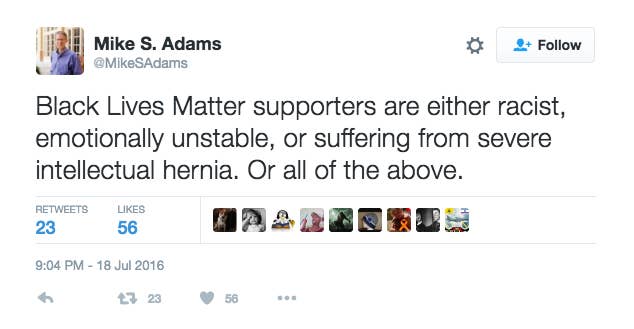
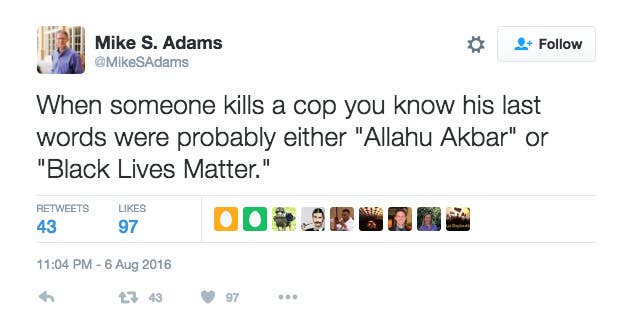
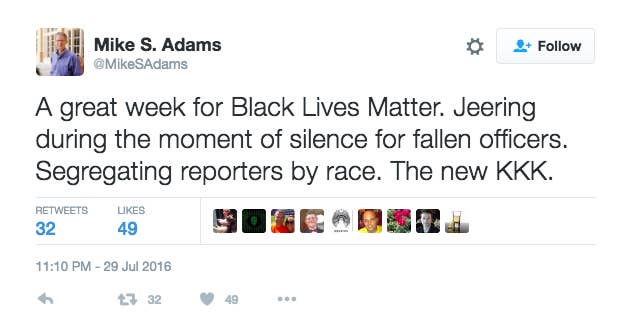
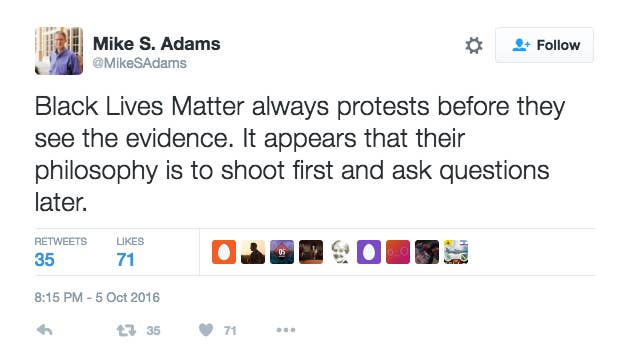
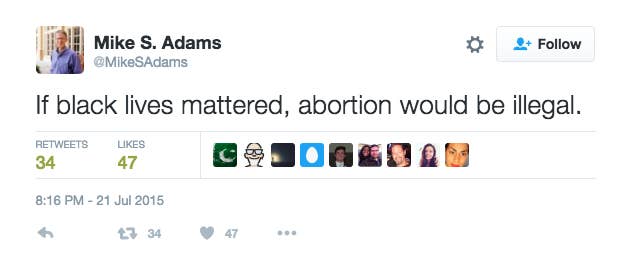
ON LGBTQ
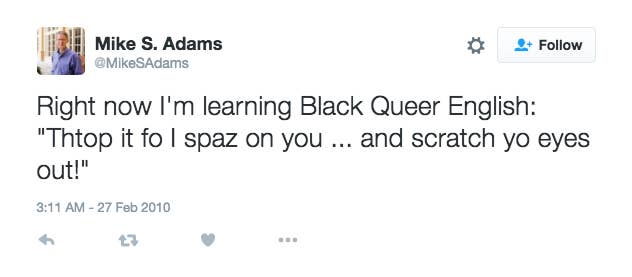

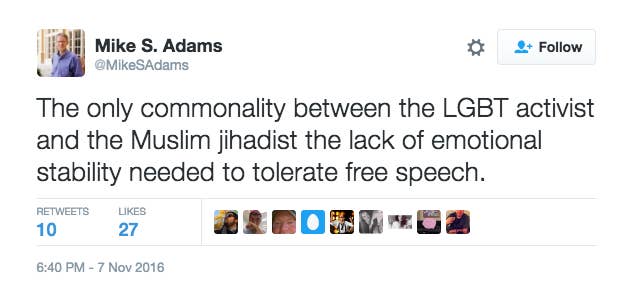
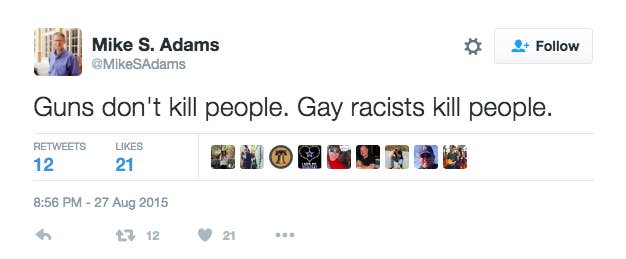
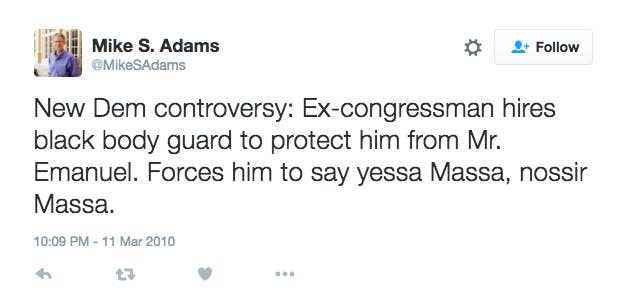
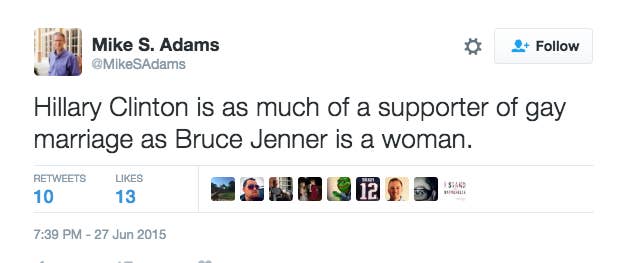
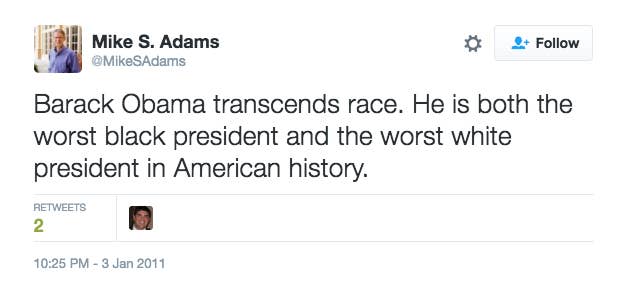

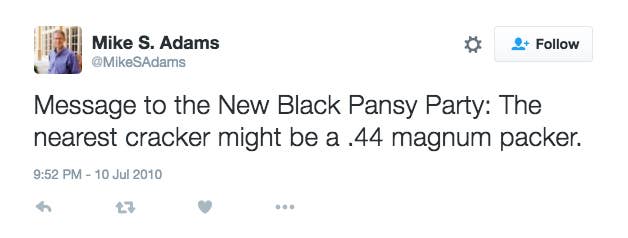
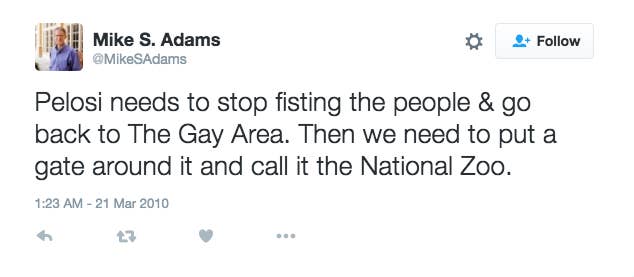
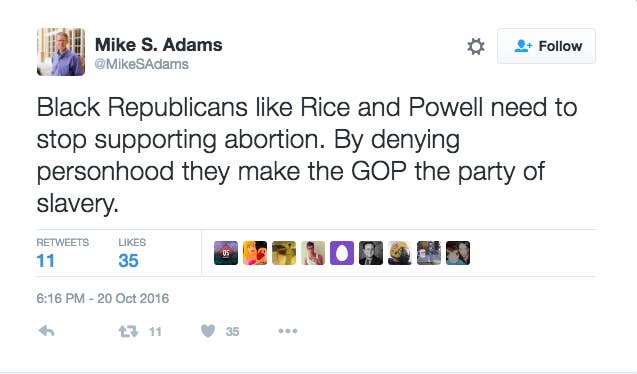
ON MUSLIMS
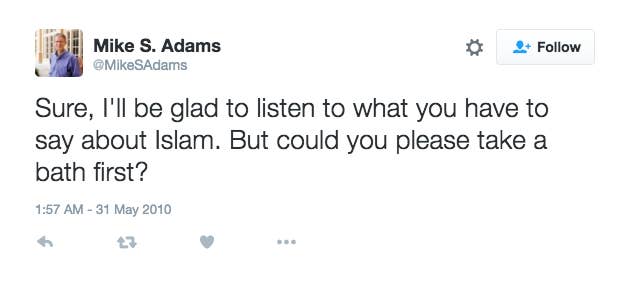
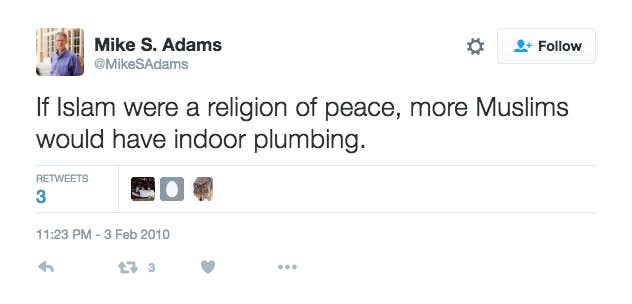
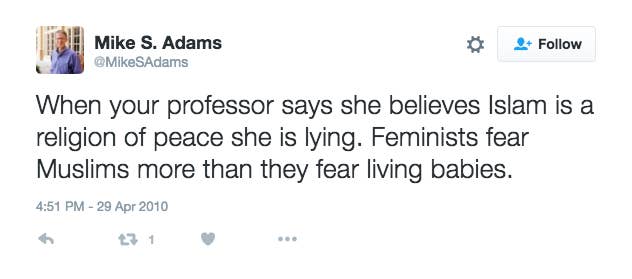
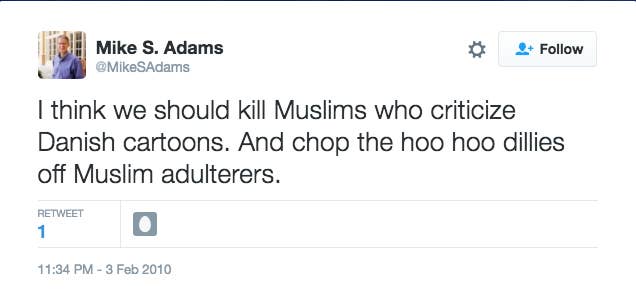
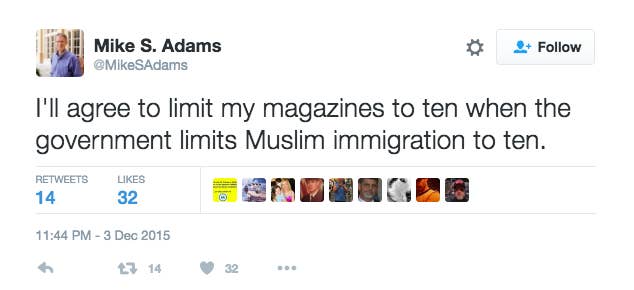

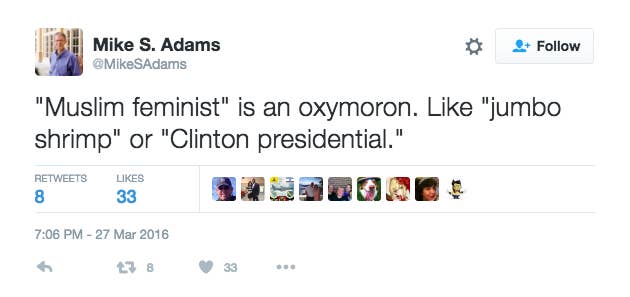
---30---

Tasneem Nashrulla is a reporter for BuzzFeed News and is based in New York.
